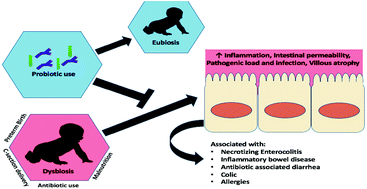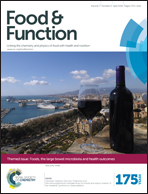Probiotics in early life: a preventative and treatment approach
Abstract
Microbial colonization of the infant gut plays a key role in immunological and metabolic pathways impacting human health. Since the maturation of the gut microbiota coincides with early life development, failure to develop a health compatible microbiota composition may result in pathology and disease in later life. Probiotics are live microorganisms that, when administered in adequate amounts, confer a health benefit on the host. Maternal transfer of microorganisms is possible during pregnancy and lactation, and the mother's diet and microbiota can influence that of her offspring. Furthermore, pre-term birth, Caesarean section birth, formula feeding, antibiotic use, and malnutrition have been linked to dysbiosis, which in turn is associated with several pathologies such as necrotizing enterocolitis, inflammatory bowel diseases, antibiotic associated diarrhea, colic, and allergies. Thus, early life should represent a preferred stage of life for probiotic interventions. In this context, they could be regarded as a means to ‘program’ the individual for health maintenance, in order to prevent pathologies associated with dysbiosis. In order to elucidate the mechanisms underlying the benefits of probiotic administration, pre-clinical studies have been conducted and found an array of positive results such as improved microbial composition, intestinal maturation, decreased pathogenic load and infections, and improved immune response. Moreover, specific probiotic strains administered during the perinatal period have shown promise in attenuating severity of necrotizing enterocolitis. The mechanisms elucidated suggest that probiotic interventions in early life can be envisaged for disease prevention in both healthy offspring and offspring at risk of chronic disease.

- This article is part of the themed collections: Probiotics, Prebiotics and Gut Health and Foods, the large bowel microbiota and health outcomes

 Please wait while we load your content...
Please wait while we load your content...